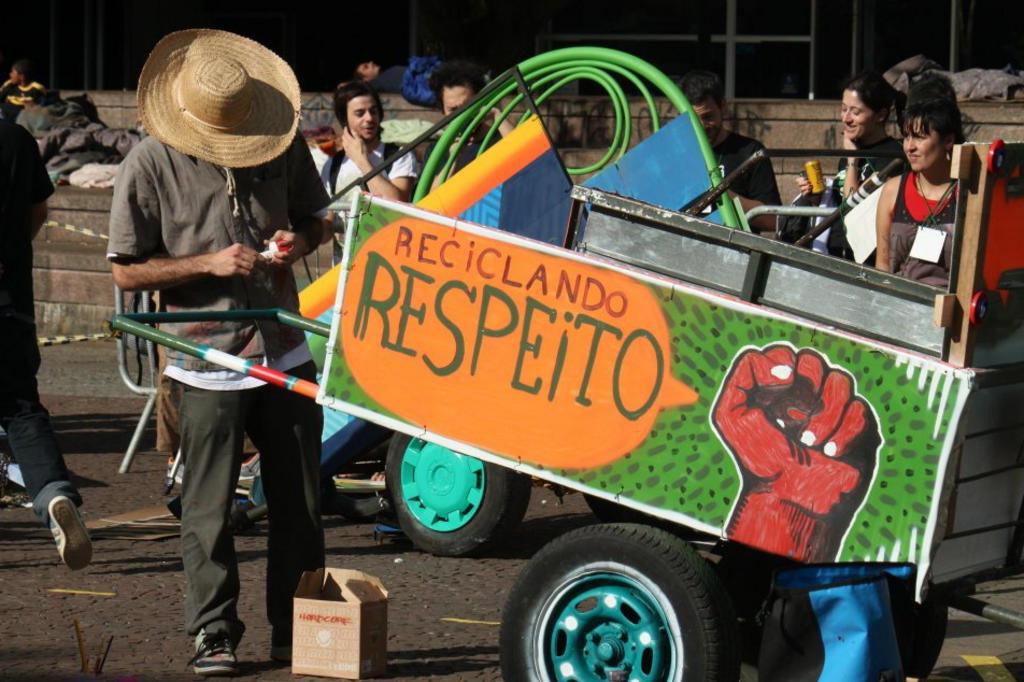Brazilian Recycling Workers, or Catadores, Envision a Fairer Future through a New Platform Co-op

This summer, our team started conversations with an exceptional organization working in Brazil called Cataki. Led by Thiago Mundano, Cataki organizes “catadores,” or garbage pickers, in Sao Paulo and other cities across Brazil. By allowing residents and businesses to request a catadore through an app, they call them to a certain location to collect recyclable trash. The catadores make money by helping the city to recycle waste instead of sending it to a landfill. The ecological impact of this work is crucial: by some estimates up to 90% of all recycling that occurs in Brazil comes from the work of catadores.
This project began more than 6 years ago, originally with the goal of improving the safety and working conditions of workers. Because waste-picking has been traditionally undervalued and purposefully overlooked, catadores are often at risk for serious injury on public roads and are often assumed to be homeless, and subject to harassment and assault. Mundano’s first project, Pimp My Carroca, worked to change this preconception and brought attention to the catadores by encouraging local artists to paint and decorate workers’ carrocas — their two-wheeled metal carts for carrying recyclables. Watch Mundano’s TED Talk about how this work developed here.
Now, catadores are organizing to improve their economic conditions and work cooperatively. The Cataki app launched 18 months ago as a prototype. It has since registered more than 600 workers in 150 cities across Brazil, with most of these workers concentrated in Sao Paulo. Though Cataki is making headway, 93% of catadores nationwide still work autonomously with no union or cooperative support. The potential for an app that organizes these workers into a cooperative is huge. In 2010, Brazil reported 387,910 catadores nationally. Even more are expected to be working as trash-pickers today.
While the prototype of the Cataki app is working, it needs to be reworked from scratch to encourage more users. This is where our teams plan to help. Over the next several months, through co-design sessions with the Cataki team and catadores in Brazil, and through an on-the-ground developer based in Cataki’s Sao Paulo office, we will help Cataki improve their labor platform and organize workers as a democratically-run cooperative. By engaging with Cataki as one of the five pilot groups for our Kit, our teams will be able to directly improve the app’s functionality and performance, and share open source designs to be used by other trash-pickers around the world.
The potential to scale our work with Cataki is huge. Already, we have been in touch with trash-pickers from Egypt looking to organize in a similar way. And as the Economist magazine article on Cataki notes, it is estimated that 1% of all city-dwellers in developing countries currently work as recycling pickers. Over the past few months, Cataki has also been in touch with like-minded partners from 13 different countries around the globe. By developing an open source labor platform and learning the best ways to manage the democratic governance of distributed catadores workers, we can develop important lessons that can eventually be shared through the Platform Co-op Development Kit.
Moreover, our movement can point to yet another example of how platform co-operativism can directly intervene as an economic model in a unique industry, and organize workers effectively.
Do you have an organization that may be interested in collaborating with us on this work? Let us know. We are initiating work with the Cataki team now and would like to know your thoughts and needs. Write to us at info@platform.coopersystem.com.br and get involved.